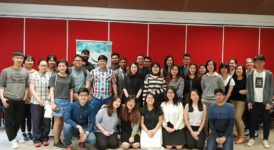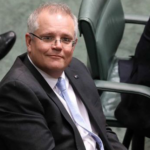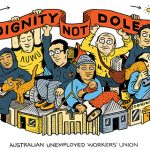Struggling International Students Left in Dire Straits

Over recent decades, Australia has invested heavily in its international education sector, which currently involves around 565,000 overseas students. And as the nation’s fourth largest industry, it employs around 240,000 people and it racked up $37.6 billion in the last financial year.
International students pay a premium for the education they receive in this country. And they work casual jobs while they do so. Overseas students pay taxes. They spend their money on local goods and services. And they pay rent to Australian landlords.
Indeed, international students have long been an integral part of Australian communities in major cities and university towns across the nation. However, now that the COVID-19 crisis has led to an economic downturn, the prime minister has basically told them to go jump.
Following a 3 April national cabinet meeting, Scott Morrison told reporters that “all students who come to Australia in their first year have to give a warranty that they are able to support themselves for the first 12 months of their study”.
And given this proviso, the captain said if international students now find themselves “not in a position to support themselves, then there is the alternative for them to return to their home countries”.
Now this safety net warranty is only $21,041. And for those who’ve lost their jobs and weren’t required to have it, there’s no allowance being made for them in the wage subsidy packages. And further, flying home when borders are closed and the downturn is global isn’t that easy.
No real option
“I am very disappointed with what Scott Morrison said. International students who are temporary visa holders simply can’t go home.” said Abbey Shi. “If the prime minister takes a reality check, he will see that a lot of the countries have incoming travel bans.”

The 23-year-old Sydney University fourth year law student explained that on top of the border lockdowns, “a lot of international flights have been cancelled, and the prices for the remaining flights are sky high”.
Ms Shi further explained that not only do the JobSeeker and JobKeeper allowances fail to provide any financial assistance to newly unemployed overseas students, but neither does the $18 billion higher education relief package that was announced last week.
And while the fortnightly 40 hour limit on work that applies to international students has been partially lifted, Shi points out that this has only been done for the retail and health sectors, which are now industries that have become dangerous to work in.
“In the long term, the message that’s being sent out by the current government is they don’t welcome international students here,” the Sydney University Students’ Representative Council (SRC) general secretary added. “When it’s hard times, they just let people go.”
Institutions step up
Sean Stimson is the head of the Redfern Legal Centre’s (RLC) International Student Service. He explained that the centre’s past research points to about 60 percent of international students not being in a position to maintain themselves without ongoing work.
In NSW, this transpires to around 120,000 students from overseas, who now find themselves in “precarious situations” if they don’t work at supermarkets or in the health industry. And these individuals are not only without an income, but their tenancies are now jeopardised.
According to Stimson, the PM’s “go home” advice is easier said than done. “Many clients I speak to want to go home, as they don’t want to be isolated from their families.” However, due to the lack of flights and rising border restrictions “returning home is incredibly hard for them to achieve”.
The government’s abandonment, the solicitor continued, means everything is now resting on educational institutions to provide support. “We’re directing our clients to engage with their education providers to see what financial support packages are being offered,” he explained.
Australian universities have this week announced a $110 million hardship package, which will be distributed amongst students from abroad, who are experiencing financial difficulties. And private colleagues are also providing some assistance to students.
You work here, you work here
“It is very easy to just categorise people by visa status, or call them student migrants, but these are real human beings, and they live and work here,” said Unions NSW assistant secretary Thomas Costa. “They pay tax. And they pay a high premium to study here.”
Costa stressed that one thing that’s missing from this debate is that international students actually live in this country, regardless of the temporary nature of their visas. And he explained that Unions NSW has a clear stance that “anyone who lives and works in Australia is an Australian worker”.
“They should be entitled to exactly the same support from the federal government,” Mr Costa told Sydney Criminal Lawyers. And he called upon the ministers within the Morrison cabinet that can amend the wage subsidy packages to do so immediately to include all migrant workers.
As for Morrison’s suggestion that struggling students leave the country, Costa made clear that “apart from it just being completely heartless, it’s a disingenuous comment to make”. And he added that the PM is well aware of this.
The long-term workers’ rights advocate asserts that returning home isn’t feasible due to the international lockdown, as well as the fact that these people have invested heavily in the education they’re receiving over here, and they need to continue on with it.
True colours revealed
“Due to COVID-19, international students are stuck in Australia and a lot of them have lost their jobs,” explained Australian Federation of International Students (AFIS) partnerships director Olena Nguyen.

The 22-year-old social work student from Vietnam said the AFIS has been overwhelmed with reports of students who’ve lost their jobs, are now struggling to make ends meet and yet, are left without any assistance from a government that was willing to accept their money when times were good.
Ms Nguyen pointed out that international students have been contributing to the Australian economy in a myriad of ways – besides fees, they pay tax, they pay for goods and services, and they often work in positions that are hard to fill because of their irregular nature.
The student added that those from abroad are frustrated with the prime minister’s suggestion that they simply return home, especially when people back in their own countries are experiencing the same sort of downturn that’s happening here.
“It’s really shocking to hear what the prime minister said, because we contribute a lot to the Australian economy,” Ms Nguyen concluded.
“We want the government to know that international students in Australia really need their support.”







